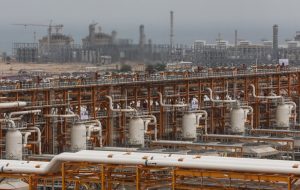Daily gas injection into national network reaches 855 million cubic meters in winter
TEHRAN – The head of the National Iranian Gas Company (NIGC) announced that approximately 855 million cubic meters of natural gas are delivered daily to the national gas network during the winter. In a televised interview on Friday evening regarding gas consumption management during the cold season, Saeed Tavakoli stated: “Although Iran possesses the world’s


TEHRAN – The head of the National Iranian Gas Company (NIGC) announced that approximately 855 million cubic meters of natural gas are delivered daily to the national gas network during the winter.
In a televised interview on Friday evening regarding gas consumption management during the cold season, Saeed Tavakoli stated: “Although Iran possesses the world’s second-largest gas reserves, this does not mean there is no energy imbalance. Approximately 75 percent of the country’s gas reserves are located in the southern regions, primarily offshore, which requires significant efforts to deliver gas to all parts of the country.”
Highlighting that 72 percent of the country’s energy mix consists of natural gas—a percentage unmatched globally, even in Russia—Tavakoli noted: “Natural gas constitutes 85 percent of the fuel used in power plants, with the remaining 15 percent comprising eight percent diesel and seven percent fuel oil.”
He emphasized that despite various limitations, efforts have been made to ensure gas supply continuity during winter, stating: “Nearly 855 million cubic meters of gas are prepared and delivered to the national network daily during the cold months.”
Tavakoli, who also serves as Deputy Minister of Oil for Gas Affairs, predicted peak consumption levels of 690–700 million cubic meters in the coming week, with 82 percent of the demand attributed to residential, commercial, and small-scale industrial sectors.
He explained that most gas consumption in residential and commercial sectors is for heating purposes, adding: “When outdoor temperatures drop by just one degree, consumption in this sector rises by 25 million cubic meters—the equivalent of the output of one phase of the South Pars Gas Field.”
Tavakoli outlined the gas distribution, noting that 34 percent of gas is annually supplied to power plants and another 34 percent supports industries, while 25 percent is consumed by the residential sector. He added that during peak winter consumption period, residential, commercial, and small-scale industrial demand disrupts this balance.
Emphasizing the need for fuel diversity in power plants, Tavakoli stated: “Based on regional planning, around 14 steam power plants across the country are capable of using fuel oil. However, aligning fuel oil delivery levels to meet demand remains a challenge.”
He stressed the importance of addressing the energy imbalance through consumption management, energy efficiency, and production increases, stating: “Approximately 70–80 percent of residential gas consumption is for heating, with 13–17 percent used for water heating and 2–3 percent for cooking. Enhancing efficiency in these areas is essential.”
Tavakoli praised President Pezeshkian’s commitment to addressing energy challenges and highlighted the government’s “two-degree temperature reduction campaign”, noting: “Over the past three months, records in oil production and liquid fuel transportation have been broken.”
He predicted a sharp temperature drop of 8–12 degrees Celsius across the country by December 16th, which could push gas consumption to 690–700 million cubic meters per day.
Tavakoli urged citizens to reduce indoor temperatures by two degrees, which could save 50 million cubic meters of gas daily, equivalent to the production of two phases of South Pars.
Drawing comparisons, Tavakoli noted that in the United States, the recommended comfort temperature in winter is below 22°C and encouraged citizens to reduce their heating to ensure adequate supply for colder regions.
He emphasized the need to allocate gas for industries to achieve the eight economic growth target outlined in the Seventh National Development Plan, noting: “While the gas reserves exist, substantial investment is required to convert them into usable production.”
Tavakoli highlighted measures taken to reduce unnecessary consumption, such as cutting gas supplies to 73,000 temporary garden villas, where heating systems are often left on unnecessarily. He also urged government offices to turn off heating systems one hour before closing on holidays and weekends.
To promote energy justice and responsible consumption, Tavakoli called for stricter measures against excessive users, including higher tariffs and penalties for those exceeding consumption patterns.
“This approach can effectively modify behaviors and ensure fair energy distribution across the country,” he concluded.
EF/MA
